The Wisdom Buddha Protector of Je Tsongkhapa's Tradition
Spiritual Lineage
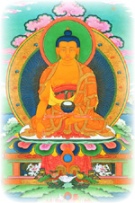
Buddha
Shakyamuni
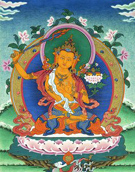
Buddha
Manjushri

Je Tsongkhapa
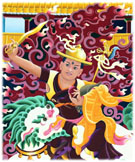 Wisdom Buddha
Wisdom Buddha
Dorje Shugden
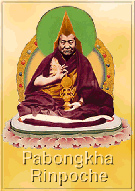
Pabongkha Rinpoche
(1878-1941)
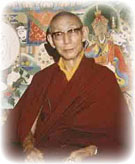
Trijang Rinpoche
(1901-1981)
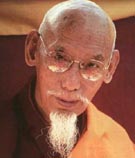
Song Rinpoche
(1904-1984)
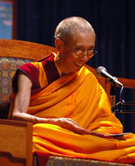
Geshe Kelsang Gyatso
(born 1931)
Why is this religious suppression taking place?
1. Blogs and websites on the subject
2. Three key political reasons behind the Dalai Lama's ban
1. Blogs and websites on the subject
There are many theories, some conflicting, as to why this religious suppression is taking place. There are a number of blogs and websites on the subject, some of which we will list here. Please note that we do not take responsibility for the content in these websites, except for our own WisdomBuddhaDorje Shugden blog (where you are welcome to post unmoderated comments).
Western Shugden Society (official website)
Wisdom Buddha Dorje Shugden blog
Western Shugden Society (unofficial blog)
Investigating the Campaign Against Dorje Shugden
Mountain Phoenix Over Tibet ~ Evil spirit puts Tibetan democracy to test
Exiled from Exile ~ Ursula Bernis Research
New Statesman Faith Column ~ The deity banned by the Dalai Lama
New Statesman Faith Column ~ Why did the Dalai Lama ban Dorje Shugden
New Statesman Faith Column ~ Are Dalai Lama's critics backed by China?
New Statesman Faith Column ~ Will the Dalai Lama return to Tibet
New Internationalist ~ Buddhists at Loggerheads
France 24 ~ The Dalai Lama's Demons
Dorje Shugden ~ Protector of Tsongkhapa's Dharma
Gangchen Rinpoche and the Shugden affair
2. Three key political reasons behind the Dalai Lama's ban
There are three key political reasons behind the Dalai Lama's ban.
1. The Dalai Lama seeks to consolidate all power under him to strengthen his hand in his negotiations with the Chinese.
The Dalai Lama's principal responsibility is as political head of Tibet. After the Chinese invasion, he felt that complete Tibetan unity was indispensible for advancing the Tibetan cause. He already had absolute political power, but to obtain absolute societal power as well, he felt he needed to unite the different schools of Tibetan Buddhism into one (under his authority). Then all of Tibet would be fully united and be able to speak with one voice (his). Towards this end, he became a staunch advocate of the Ri-me movement (a movement which seeks to practice all four schools of Tibetan Buddhism together). Those who resisted his efforts, including (but not limited to) Dorje Shugden practitioners, became seen by him to be a threat to his objective to unite all of Tibet. By extension, any who opposed him became seen by him to be a threat to the cause of Tibet and by extension to his life.
Opposing Dorje Shugden practitioners had potent political significance for getting the other schools of Tibetan Buddhism to unite around the Dalai Lama in that traditionally the Gelugpas had dominated Tibetan society for centuries. Those who resisted him were not opposed to the cause of Tibet, they simply didn't believe that the political cause of Tibet was more important than the spiritual cause of centuries-old spiritual lineages. Further, Dorje Shugden practitioners are of the view that an even stronger unity can be achieved within the Tibetan community through what the Dalai Lama teaches so eloquently abroad, namely 'Unity in Diversity'. Unfortunately, it seems the Dalai Lama does not feel these same principals apply to Tibetans. Instead, at home he practices 'Unity of Absolute Conformity', both politically and spiritually.
2. Dorje Shugden provides a convenient scapegoat for all the problems faced by Tibetans, thus deflecting blame away from the Tibetan government in exile.
The Tibetan community faces many challenges and many difficulties. Many promises have been made that have not been able to be fulfilled. The Chinese have grown in power exponentially during this same period. The Dalai Lama is correct to pursue a conciliatory approach with the Chinese in the hope of winning greater concessions from them, thus it is counter-productive to blame the Chinese for Tibetan problems. As governmental regimes around the world tend to do, a scapegoat needed to be found that could deflect blame away from the Tibetan government in exile for these challenges and failures. What better scapegoat than some unseen 'evil spirit'? Given the superstitious nature of some quarters of Tibetan society, he can conveniently be blamed for all problems and difficulties. Since Dorje Shugden practitioners were resisting falling into line behind the Dalai Lama's new presentation of Tibetan Buddhism (Ri-me), scapegoating Dorje Shugden practitioners killed two proverbial birds with one stone.
3. Persecution of Dorje Shugden practitioners distracts attention away from painful concessions being made by the Dalai Lama in the negotiations with the Chinese.
Looking back over the last 40 years, one can see a pattern emerging where the Dalai Lama ratchets up his persecution of Dorje Shugden practitioners exactly when he is required to make some of the most difficult concessions in his negotiations with the Chinese. Again, we see this political tactic being used by many regimes around the world - keep the domestic population distracted while concessions are being made at the international level. (It should be noted that we are not saying the concessions made by the Dalai Lama were misplaced, what we are highlighting here is the relationship between these politically necessary concessions and the persecution of Dorje Shugden practitioners).
To explain things simply: The Dalai Lama has two, sometimes contradictory, functions. On the one hand, he is a spiritual leader for many; on the other hand, he is the political head of state for Tibet. Prior to the Chinese invasion, the different schools of Tibetan Buddhism where able to function separately from one another, and mutual respect and tolerance existed between them. However, after the Chinese expelled the Tibetans it created a dilemma for the Dalai Lama. In order to advance the Tibetan cause against the Chinese, the Tibetan community would need to be united.
The Dalai Lama reasoned (we would say incorrectly) that the way to unite all the Tibetan people together would be to spiritually unite the four schools of Tibetan Buddhism together. Thus, the Dalai Lama himself became a practitioner of all four schools, and became a staunch advocate of the Ri-me (non-lineage) movement. He then tried to unite all Tibetans into this new presentation and form of Tibetan Buddhism.
Some practitioners, most notably the Dalai Lama's own spiritual guide Trijang Rinpoche, were of the view that the spiritual cause of centuries old lineage was more important than the political cause of Tibet, and so as a result, they did not go along with the Dalai Lama's new set of teachings. The common denominator of many of those who did not go along with the Dalai Lama's new way of practicing was that they were Dorje Shugden practitioners. This presented a unique challenge to the Dalai Lama's efforts, because in effect his 'own tradition' wasn't in agreement with what he was doing, and so that presented a serious question on the legitimacy of his actions. Thus, the spiritual non-compliance with the Dalai Lama's wishes became perceived by him as a political challenge to his authority.
It is for this reason that he came to view Dorje Shugden practitioners as a threat to the unity of Tibet - they would not recognize his spiritual authority to override centuries of lineage for the sake of political expediency. And since he considers himself to be intricately linked with the cause of Tibet, anything that is a threat to the cause of Tibet is by extension a threat to his life - thus he claims Dorje Shugden practitioners are a threat to his life. As politicians sometimes do, he then created a pretext for what was in fact a political move to marginalize any opposition to his consolidation of all power (political and spiritual) under his leadership. His pretext was that Dorje Shugden was an evil spirit. Therefore, those who relied upon him are not Buddhists. If they are not Buddhists, then they can no longer represent a challenge to his authority. Because in Tibet religion and politics are one, to disagree with the political dictates of the Dalai Lama is tantamount to disagreeing with the Dharma (the teachings of Buddha), which nobody can do, and so therefore there is no scope for dissent.
This is the core political reason behind all of the Dalai Lama's actions. It is important to keep this in mind when interpreting his statements. When this political calculation is clear, then the real purpose behind the present campaign against Dorje Shugden practitioners can be seen for what it really is. We would like him to just consider that persecuting his own people as a scapegoat -- causing them incredible sadness, fear and loneliness -- is not going to win the old Tibet back, nor help the unity of the Tibetan people either now or in the future.
Dorje Shugden practitioners are feeling immense sorrow at this time. They have hurt no one. They have done nothing wrong. They are not interested in politics. They are peaceful Buddhist practitioners, lay and ordained, dedicated to helping all living beings find a deep inner peace and happiness. Many have hoped and prayed for years (since the Dalai Lama started speaking out in the 1970s and then issued the ban in the 1990s) that this nightmarish problem of being rejected by their own Dalai Lama will go away, that it is just a bad dream; but it has only worsened such that they now feel obliged to seek help from others, to ask the world to listen.
They have no wish to harm the Dalai Lama at all. All they want is the freedom to continue practicing the compassion, love and wisdom of the Buddhist tradition of Je Tsongkhapa and to rely upon Dorje Shugden as the Wisdom Buddha Protector of that tradition. They want to do this while remaining regular and even valued members of their society, without segregation or persecution.
These thousands of abbots, monks, nuns, lamas, and lay families are just as dedicated to a peaceful and successful future for Tibet as any of their fellow Tibetans. There would be no reason for them to say they were being denied their human rights if it were not happening.
This conflict might at first glance seem like an arcane religious problem but in reality it is a human rights' issue and a case of religious persecution based on a political decision. So far no one has been burnt at the stake, but many have been threatened with murder, physically attacked, forced to leave their communities, schools, homes or workplaces, refused entry into shops to buy food, refused identity cards (and the ability to travel freely etc), and so on.
There is no record anywhere of any of them retaliating. They are dedicated to non-violence in the tradition of their teachers. Some are demonstrating in the manner of Martin Luther King to stand up for their rights and freedom and some are trying to instigate court proceedings. They are on the defensive, not the offensive.
If you can, please take some time to hear them. Read the articles on this website (or anywhere else) to decide for yourself what is going on.
Political Leader
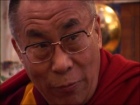 Dalai Lama
Dalai Lama
The Hypocrisy
Follow the story of the Dalai Lama's 30-year political campaign to destroy a centuries-old spiritual tradition taught to him by his own Spiritual Guide, and the efforts of those he's hurting to stop him:
Brief summary
- What is happening
- What is the Western Shugden Society (WSS)?
- Detailed reports of discrimination from inside India and elsewhere
The Dalai Lama's position
- A Great Deception
- Praise to Wisdom Buddha Dorje Shugden by the Dalai Lama
- In the Dalai Lama's words
Why is this happening?
- Why is this religious suppression taking place?
- Are the Dalai Lama's reasons valid?
Efforts to restore religious freedom
- Geshe Kelsang's open letter
- The ban is illegal and unconstitutional
- Press reports and videos
- Dorje Shugden Devotee's Charitable and Religious Society
- Dalai Lama sued for repressing religious freedom
- A conflict with a solution
- Announcement from Serpom Norling Monastery
Analysis of situation
- Sectarianism
- Can the Dalai Lama ever make a mistake?
- Is the Dalai Lama the only spiritual leader in Tibetan Buddhism?
- Theocracy or democracy?
- Spirit worship or authentic Buddhist practice?
- Freedom of worship
- The Dalai Lama's justifications
- Analysis by Dalai Lama's translator (PDF)
- What would Thomas Jefferson think of the 14th Dalai Lama?
- Book Reviews
- Videos
Evidence and first-hand accounts
- Chronological background
- Discord in exile documentary
- Political motivations for the ban
- Summary to date from Tibetan exiles
- Other
Ongoing persecution 2008-2010
- Recent vote sticks and call for help
- Forced signature and ID card campaign
- Persecution of monks at Sera Monasteries
- Public humiliation and explusion of monks
- Letter to Indian Prime Minister regarding abuses
- Letters from Dorje Shugden Devotees
- Urgent appeal from Sera Monasteries
- Support from Indian police
- Western Shugden Society letter to Sera monasteries
- Western Shugden Society letter to TGIE
- Heartfelt request from monks in Mundgod
- More discrimination planned around the world
- Letter from an FPMT monk
- Other
- What you can do